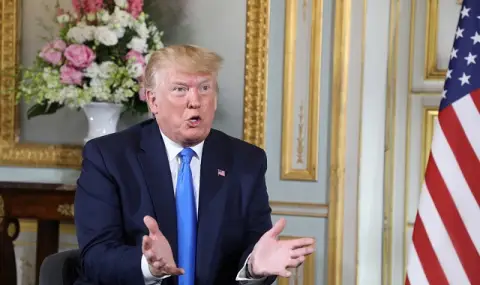By using the military against protesters in Los Angeles and ignoring clear orders from federal judges, Donald Trump is testing the limits of what is possible and shaking the most important foundations of democracy in the United States.
Tensions remain high in Los Angeles, where thousands have been demonstrating against the actions of US immigration authorities for several days. The evening curfew imposed by the city's mayor has brought some calm, but there are no signs of real de-escalation. The National Guard, which President Donald Trump sent to Los Angeles on Saturday, was followed by 700 Marines, an elite unit of the US military used as a rapid response force.
Since Friday, people in Southern California have taken to the streets to protest ICE agents who are conducting raids on public places to search for and deport undocumented immigrants. In some cases, teams of the service have arrested migrants right on the street. It's all part of the Trump administration's strict immigration policy, which now has to be defended with the help of the military.
More presidential powers in emergencies
Under normal circumstances, the US president cannot simply send the National Guard or the Navy to a state. Normally, the request for this must come from the leadership of the state concerned. In California, Democratic Governor Gavin Newsom has explicitly rejected the deployment of federal troops and has even filed a lawsuit against it.
In exceptional cases, however, the US president can call out military units to a state where there is an uprising against the authority of the national government, even without notifying the governor. This is provided for in the Insurrection Act of 1807.
Trump's decision to send troops to California is still unusual, since the autonomy of the 50 states is considered a valuable asset, as is evident from the very name "United States of America". Governor Newsom spoke of an abuse of power and warned that Trump's actions threaten democracy in the US. "California may be the first, but this is clearly not the end," Newsom said in a televised address on Tuesday evening. "Other states will follow. Democracy is next."
Trump clashes with institutions
In the first five months of his second term, Trump has already clashed with the country's democratic institutions several times. For example, over the deportations that Trump has imposed in violation of clear court orders. Since March, he has deported more than 250 suspected terrorists who are not US citizens to El Salvador. The flights transporting the migrants to a notorious prison in the Central American country are being carried out despite a temporary ban by a federal judge.
As now in Los Angeles, Trump invoked an archaic law - the – “Foreign Enemies Act“ from 1798, which allows the president to deport aliens from an "enemy nation" without waiting for the usual procedures in immigration courts. The Trump administration claims that the deportees are terrorists from the Venezuelan gang "Tren de aragua", which means that its actions are legally justified.
The judiciary is one of the three pillars of power in the United States, along with the executive (of the president) and the legislative (of the US Congress). The separation of powers is the foundation of American democracy. However, Trump's behavior does not seem to support this separation. On the highest court in the United States, the Supreme Court, six of the nine justices are outspoken conservatives, three of whom were appointed by Trump himself. And this creates a favorable environment for decisions that benefit the president.
Will the principles of democracy prevail in the United States?
And what about the legislative branch? Trump bypassed Congress at the beginning of his second term. Every president issues executive orders that do not require the approval of the House of Representatives and the Senate, the two chambers of Congress. But Trump has issued an unusually large number of such orders: a total of 161 since the beginning of his second term - more than any other president since World War II. And they have serious consequences, for example, for the rights of the LGBTI community in the United States or for global trade.
“Trump will definitely go down in history as a man who tested how far the powers of the executive branch can be stretched“, writes Patrick Malone, a professor of public administration and politics at American University, in response to DW. There are doubts, for example, whether it was legal for the president to close federal agencies and massively fire federal employees in the name of efficiency, he adds.
"The courts will deal with the question of the legality of this president's actions for years," the political scientist also says. And what about the state of the democratic institutions of the United States, which are under serious pressure? One of the problems is that US laws are being applied today in a country that is completely different from the one in which they were created more than 200 years ago, says Malone.
However, he remains optimistic: "In principle, it is very difficult to destroy institutions. "I hope that the principles of democracy will ultimately prevail," the expert says.
